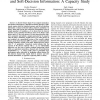324 search results - page 47 / 65 » Attention can improve a simple model for object recognition |
89
Voted
IEAAIE
2009
Springer
15 years 6 months ago
2009
Springer
Abstract Unipolar depression is a mental disorder characterized by a persistent low mood and loss of awareness or contentment in usual activities [1]. Despite the modern era of pha...
122
click to vote
SPIN
2004
Springer
15 years 5 months ago
2004
Springer
Most approaches for model checking software are based on ration of abstract models from source code, which may greatly reduce the search space, but may also introduce errors that a...
ASPLOS
2006
ACM
15 years 5 months ago
2006
ACM
Clustered Objects (COs) [1] have been proven to be an effective ion for improving scalability of systems software [2, 3]. But can we devise a programming model that would allow CO...
SIGECOM
2004
ACM
15 years 5 months ago
2004
ACM
The revelation principle is a cornerstone tool in mechanism design. It states that one can restrict attention, without loss in the designer’s objective, to mechanisms in which A...
112
Voted
ICC
2009
IEEE
14 years 9 months ago
2009
IEEE
A discrete (binary-input 2q -ary output) communication channel with memory is introduced with the objective to judiciously capture both the statistical memory and the soft-decision...

